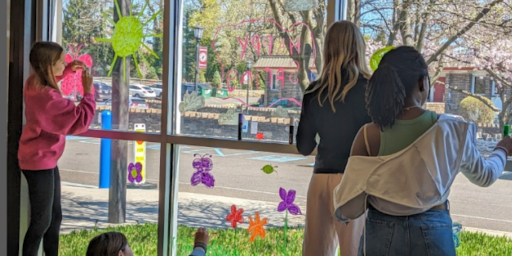
Rainy Korein '27
“You just read all day, right?” is a common assumption that will have many librarians rolling their eyes. In the words of Sara Huff, librarian at the Abington Public Library, that is “the farthest from the truth.
While free books are important tools to level the playing field of literacy, libraries function as far more than storage units for books. As a librarian, Huff’s tasks vary wildly.
“I never know what I’m gonna do, what the day’s gonna bring,” Huff said. “In one day, I can help someone apply for a job, help someone do research for a school project, do an interview with you, I can help find a book for somebody ….”
A significant chunk of Huff’s time is also devoted to leading various community groups and volunteer events.
“You just never know what the day’s gonna bring and people are overwhelmingly so appreciative of what we do. I often hear things like ‘I love the library’ and ‘you guys are the best’. Yesterday I helped a woman print out song lyrics for this gig she was doing with her band and to thank me she gave me homemade Shepherd’s Pie. We don’t expect anything in return and we do this job because we love it but it is really nice when someone does something like that.”
Huff devotes much of her time to organizing and leading community groups that form connections with local teens and adults, including Q-Crew – a social and volunteer space for queer teens – and the Abington Library Teen Advisory Board (AB-TAB) – a space where teens are encouraged to use their voices to make the library a more widely appealing space by adding elements relevant to youth interests.
As a participant in both Q-Crew and AB-TAB, I can attest that these spaces have served as a grounding, exciting, and inspirational presence in my life where I can meet new people, use my creativity, and collaborate with peers to support a cause I believe in. I was glad to hear that these endeavors have proved rewarding for Huff as well due to their lasting positive impact.
Huff listed, “working with you all and getting to know you over the course of how many years you’re here and developing that relationship with you,” as a pro of her job, elaborating; “I’m still in touch with teens who are graduating college this spring, and they still email me and we still check in with each other. It’s a really special thing.”
Huff brought to light the way in which libraries act not only as a public resource but as a sanctuary.
“A lot of people come in and need help – they might be struggling with mental health issues, they might be struggling with hunger, they might be unhoused, they might be struggling with domestic violence.” she said, adding; “I think the thing that I struggle with the most is wanting to help people more than I’m able to…We can provide them with phone numbers and resources but I can’t fix their problems.”
This is still true even while Abington Public Library exists as one of the more fortunate ones.
Huff said, “Often public libraries are underfunded. We are lucky that this library is well-funded…but a lot of libraries struggle to provide basic resources for their community. That is a drawback. I’ve worked in libraries of different budgets, so I’ve seen all areas.”
Huff confirmed that working in underfunded libraries that have even fewer resources compounds the frustration of not being able to help everyone you want to. Chronic budget cuts create damaging repercussions for underfunded libraries and the communities that depend on them for free help, shelter, recreation, and for the resources necessary to succeed in school and work.
“They will have reduced hours (for example, they sometimes will be open 9-2 pm instead of 9-8 pm). That impacts the community – where do these people go who need library services after 2 pm? Especially kids after school or adults who work 9-5 pm.”
As underfunded libraries constantly struggle to provide the essentials, recreational resources that make places like the Abington Free Library a fun safe hangout for teens and adults alike are often out of the question.
“Cutting materials budgets…means that budgets for books, DVDs, and other items are often cut. So they can only dream about having specialty items like board games and hotspots,” Huff said.
Another victim of budget cuts that limit the ability of underfunded communities to benefit from and participate competitively in our digital world is technological resources.
“Technology is constantly changing. Underfunding may prevent libraries from investing in updated technology which can lead to slow internet speeds and limited access to digital resources….We might assume that everyone has access to high-speed internet, but that’s not true. Forty-two million Americans are without broadband internet. This impacts daily lives, like homework and parents working from home.”
Huff says that the simplest way to support underfunded libraries is to get a library card for one.
“Library cards are an important part of the report we have to show the state each year…Getting a library card shows ‘this many people in the community got library cards this year’, so we could show the state ‘look how many people use us.’”
The Free Library of Philadelphia offers cards free of charge to anyone living in the state of Pennsylvania. Your Free Library card will allow you access to all the Free Library locations in Philadelphia, as well as showing your support for each one of those locations. You can find instructions on how to get one here.